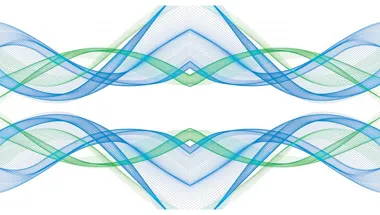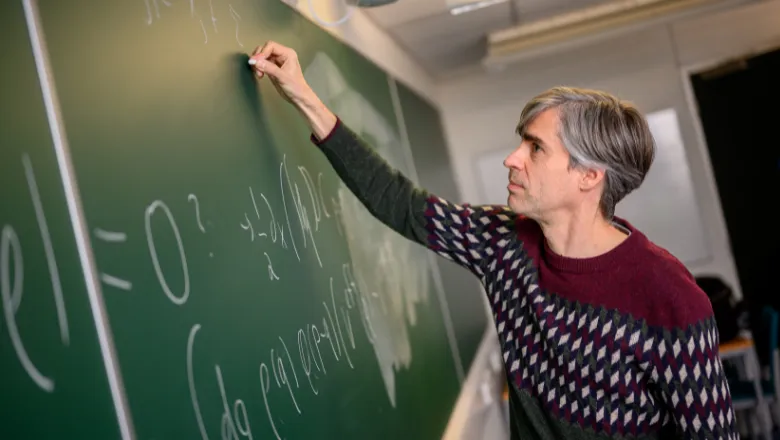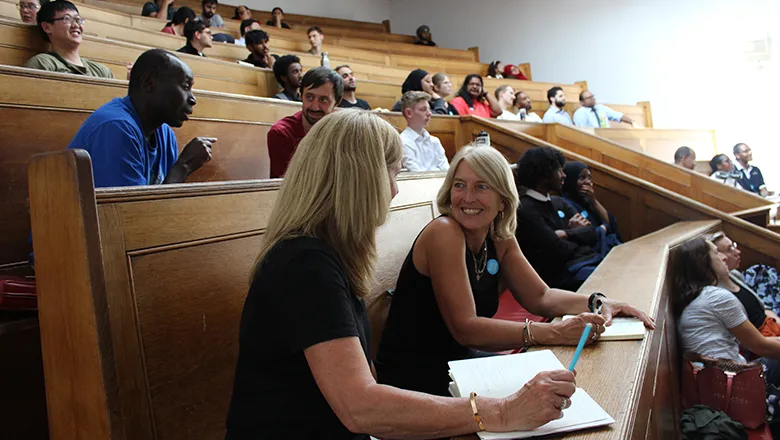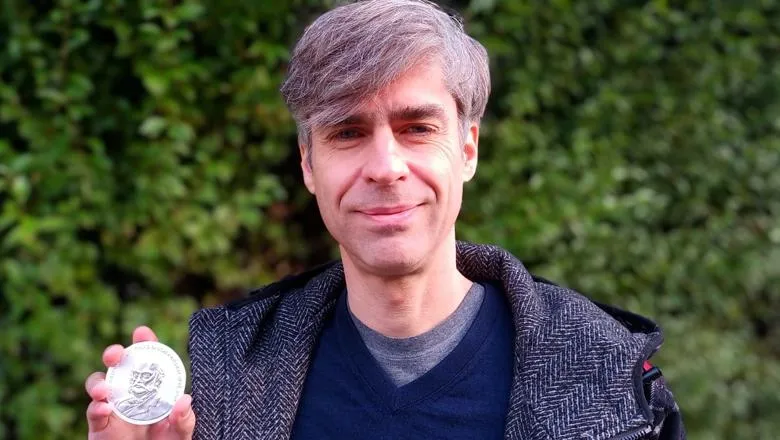
Professor Benjamin Doyon
Co-chair in Disordered Systems
Biography
Benjamin Doyon is a Professor of Theoretical Physics in the Department of Mathematics at King's College London. Professor Doyon was an undergraduate at Université Laval (Québec, Canada) from 1995 to 1998, where he obtained his baccalaureate degree in physics. He completed his PhD on the subject of integrable quantum field theory which he studied from 1998 to 2004 at Rutgers University (New Jersey, U.S.A.), partly funded by a four-year NSERC (Canada) fellowship and under the supervision of Professor Sergei Lukyanov. While at Rutgers, he also participated in a programme of study and research in mathematics under the supervision of Professor James Lepowsky, and had the opportunity to work in condensed matter theory with Professor Natan Andrei.
He obtained an EPSRC postdoctoral research fellowship from 2004 to 2007, spent at the Rudolf Peierls Centre for Theoretical Physics of Oxford University under the guidance of Professor. John Cardy. He was lecturer in mathematics in the theoretical physics group of Durham University from 2007 to 2009, where he started the supervision of his first PhD student in the summer of 2009.
Prof Doyon was appointed to a lectureship at King's College London from January 2010, was promoted to Senior Lecturer in September 2014, and to Reader in September 2016. For one year from January 2019, he held the position of Royal Society Leverhulme Trust Senior Research Fellow and was promoted to Professor of Theoretical Physics in February 2021.
He obtained various EPSRC grants (2010-2012, 2016-2019, 2021-2022, 2022-2024), and in 2025 an ERC Advanced Grant (funded under the “Horizon Europe guarantee” scheme by UKRI) and an ERC Synergy Grant with Oliver Bénichou, Aurélien Grabsch (LPTMC, Sorbonne University) and Kirone Mallick (IPhT, CEA Saclay). Since November 2021, he is external member of the Centre de Recherches Mathématiques (CRM) Mathematical Physics Laboratory, and since 2024, of the CRM, at the Université de Montréal, Québec, Canada.
Prof Doyon is also currently recipient of a Will International Chair (2025 - 2029), at Université de Lille.
Prizes
Professor Doyon was awarded a number of prizes:
The AHP Birkhauser Prize 2020 joint with his former PhD student Jason Myers, for their paper “Fluctuations in Ballistic Transport from Euler Hydrodynamics”.
The John William Strutt, Lord Rayleigh Medal and Prize 2022 from the Institute of Physics "for pioneering contributions to a new hydrodynamic theory for the large-scale behaviours of integrable systems, which had a major influence in condensed matter, cold atomic and statistical physics research".
The Journal of Physics A best paper prize 2024, joint with Jacopo De Nardis, for their paper “Hydrodynamic gauge fixing and higher order hydrodynamic expansion”.
The 2025 Frontiers of Science Award from the International Congress of Basic Science, joint with his team members Olalla A. Castro-Alvaredo, Takato Yoshimura for their paper “Emergent hydrodynamics in integrable quantum systems out of equilibrium”, and joint with another team Bruno Bertini, Mario Collura, Jacopo De Nardis, Maurizio Fagotti for their paper “Transport in Out-of-Equilibrium XXZ Chains: Exact Profiles of Charges and Currents”.
Research interests
One of the most exciting ideas in modern science is that of emerging complex phenomena from simple fundamental laws. This beautiful idea led to many new developments in the theoretical physics of many-body systems, and is at the basis of a large variety of subjects, from fundamental particle physics to macroeconomics to life itself. In his research Benjamin studies such emerging behaviours, especially in the context of quantum and classical statistical physics, concentrating on the theoretical and mathematical aspects. He likes to obtain exact formulae and develop new methods and mathematical frameworks in order to have a good understanding of the emerging physical principles that are at play. He uses the extensive toolboxes of integrability, field theory and, recently, fluid dynamics as well as C-star algebras and functional analysis.
His early works concentrated on integrable quantum field theory, where he worked on two-dimensional critical statistical models on curved space, integrable quantum field theory at nonzero temperature, and the relation between quantum correlation functions and integrable partial differential equations. He has also developed aspects of vertex operator algebras, conformal loop ensembles, conformal field theory out of equilibrium and its large-deviation theory. More recently he has worked on quantum entanglement in many-body systems, where he co-authored the paper introducing in this area the widely used concept of branch-point twist field, and emergent hydrodynamic principles in many-body quantum and classical physics, where he has obtained mathematically rigorous results on thermalization and generalized Gibbs ensembles and has co-authored many of the foundational papers for the extremely active subject of generalised hydrodynamics (the hydrodynamics of integrable systems).
Further information
Research

Disordered Systems
The Disordered Systems group at King's is at the forefront of research in statistical mechanics of disordered and complex systems.

Centre for Non-Equilibrium Science (CNES)
CNES acts as an international hub for cross-disciplinary research in non-equilibrium science.

Universal hydrodynamic principles and emergent physics
The project will develop the universal principles behind hydrodynamics as a theory for the emergent, large-scale physics of interacting matter.
Project status: Ongoing
News
King's awarded share of €18m to study heart health and complex systems
Two King’s scientists have been awarded a share of prestigious EU grants worth €18 million for projects that seek understand the link between body fat and...

Physicist awarded prestigious European Research grant to advance hydrodynamics as a unifying theory of physics
An expert in hydrodynamics – the theory of waves and quantum theory, Professor Benjamin Doyon has won an ERC Advanced Grant

Teaching maths beyond the classroom at King's annual Maths Teachers' Conference
Academics joined over thirty teachers from across state schools in London to enrich their maths learning

Maths Professor at King's awarded top Institute of Physics prize for theoretical physics
Professor Benjamin Doyon received the 2022 John William Strutt, Lord Rayleigh Medal and Prize

Research

Disordered Systems
The Disordered Systems group at King's is at the forefront of research in statistical mechanics of disordered and complex systems.

Centre for Non-Equilibrium Science (CNES)
CNES acts as an international hub for cross-disciplinary research in non-equilibrium science.

Universal hydrodynamic principles and emergent physics
The project will develop the universal principles behind hydrodynamics as a theory for the emergent, large-scale physics of interacting matter.
Project status: Ongoing
News
King's awarded share of €18m to study heart health and complex systems
Two King’s scientists have been awarded a share of prestigious EU grants worth €18 million for projects that seek understand the link between body fat and...

Physicist awarded prestigious European Research grant to advance hydrodynamics as a unifying theory of physics
An expert in hydrodynamics – the theory of waves and quantum theory, Professor Benjamin Doyon has won an ERC Advanced Grant

Teaching maths beyond the classroom at King's annual Maths Teachers' Conference
Academics joined over thirty teachers from across state schools in London to enrich their maths learning

Maths Professor at King's awarded top Institute of Physics prize for theoretical physics
Professor Benjamin Doyon received the 2022 John William Strutt, Lord Rayleigh Medal and Prize

